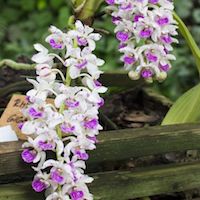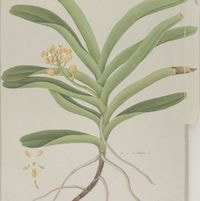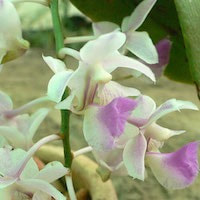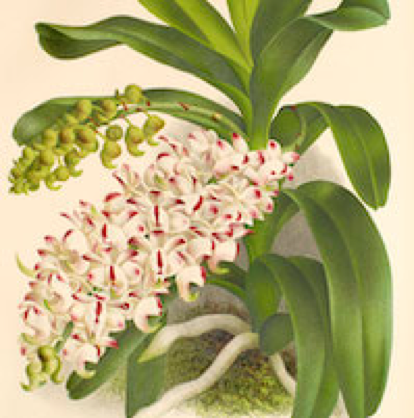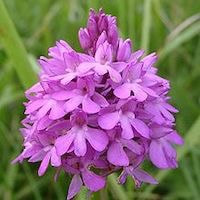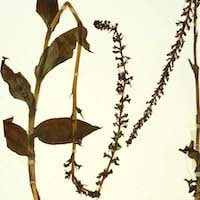Experience the Essence of Well-Being with Citrus Aromatherapy for Women
The fragrance contains scented notes of two orchid species: Rhynchostylis Gigantea and Acampe carinata (Griff.) Panigrahi. Rhynchostylis Gigantea, also known as foxtail orchids, have a strong citrus fragrance. They bloom in autumn and winter, typically flowering 1-3 times a year in Singaporean climate. The flowers are highly fragrant and can last up to 3 weeks.
Acampe carinata is a robust orchid with rigid flowers and leaves. It is commonly found in Thailand, Myanmar, Sikkim, Mumbai, the Western Ghats, and Sri Lanka. In rural Thailand, the entire plant is used as a tonic to strengthen the body. In the eastern Indian state of Orissa, the root paste is applied externally to treat scorpion and snake bites. Additionally, in Uttarakhand in the Western Himalayas, A. carinata is used for treating rheumatism, sciatica, and nerve pain.
In addition to these, other orchid species mentioned are Aerides falcata Lindl. and Aerides odorata Lour. Aerides falcata produces numerous sprays of highly fragrant white flowers and is distributed in Thailand, Indochina, and Myanmar. In Vietnam, it is used as a tonic for weak infants and its seeds are applied to skin disorders. Aerides odorata, also known as Fragrant Aerides, is found in Indonesia, Thailand, and Kalimantan. It is recognized for its fragrance and is referred to by various local names.
These orchids contribute to the scented notes used in perfumes and are valued for their aromatic qualities in the fragrance industry.
Acampe carinata is a robust orchid with rigid flowers and leaves. It is commonly found in Thailand, Myanmar, Sikkim, Mumbai, the Western Ghats, and Sri Lanka. In rural Thailand, the entire plant is used as a tonic to strengthen the body. In the eastern Indian state of Orissa, the root paste is applied externally to treat scorpion and snake bites. Additionally, in Uttarakhand in the Western Himalayas, A. carinata is used for treating rheumatism, sciatica, and nerve pain.
In addition to these, other orchid species mentioned are Aerides falcata Lindl. and Aerides odorata Lour. Aerides falcata produces numerous sprays of highly fragrant white flowers and is distributed in Thailand, Indochina, and Myanmar. In Vietnam, it is used as a tonic for weak infants and its seeds are applied to skin disorders. Aerides odorata, also known as Fragrant Aerides, is found in Indonesia, Thailand, and Kalimantan. It is recognized for its fragrance and is referred to by various local names.
These orchids contribute to the scented notes used in perfumes and are valued for their aromatic qualities in the fragrance industry.
Download the guided mediation that works best with this Orchid fragrance oil
| women_citrus_essential_oil_orchi_00003.mp3 | |
| File Size: | 184820 kb |
| File Type: | mp3 |
Embrace Feminine Elegance with Refreshing Citrus Aroma
Contains Scented Notes of following in various proportions:
Native Singaporean Orchid notes: Rhynchostylis Gigantea
|
Rhynchostylis Gigantea - Used in Citrus 3 (Women) for Team building Perfume workshop
This particular species exhibits an exceptionally potent citrus fragrance. Rhynchostylis orchids are often referred to as foxtail orchids due to their elongated, slender inflorescences that are densely packed with sweet-smelling blooms. These inflorescences typically emerge during the autumn and winter seasons. In the climate of Singapore, this species generally blooms 1-3 times a year, depending on the prevailing weather conditions. The flowers possess a highly fragrant aroma and can endure for up to three weeks in the Singaporean climate. Due to its intense citrus scent, locating this species proved to be quite challenging, particularly since it primarily blossoms in the months of January and February. |
Therapeutic Orchid notes:
|
Acampe carinata (Griff.) Panigrahi
Indian Name: Kano Kato. OR Thai name: Phaya mue lung The name Acampe or Greek akampes means (rigid), which is the character of the plant. Also called ‘rigid air flower’, Acampe is a robust, monopodial epiphyte with coriaceous leaves and rigid flowers. It is easily found in throughout Thailand, and is also found in Myanmar, Sikkim, Mumbai, the Western Ghats and Sri Lanka. Herbal Usage: In rural Thailand, the entire plant of Acampe carinata is utilized as a tonic to strengthen the body. Additionally, in the eastern peninsular Indian state of Orissa, a paste made from the roots of the plant is applied externally to treat scorpion and snake bites. In the same region, a paste made from the leaves is consumed daily with a clove of garlic for a period of seven days to alleviate chest or epigastric pain. Moreover, in Uttarakhand, located in the Western Himalayas, A. carinata is employed for treating conditions such as rheumatism, sciatica, and nerve pain.The Acampe genome has been found to contain various phytochemicals, including alkaloids, anthocyanins, arundinan, bibenzyl, cypripedin, dendrobine, gigantol, glucoside, glycoside, gymopusin, hircinol, jibantine, kinsenoside, loroglossin, nidemin, orchinol, phenanthrene, phenanthropyran, rotundatin, moscatin, stilbenoid, and triterpenoid. |
|
Aerides falcata Lindl.
Chinese name: Zhijia Lan Thai names: Ueang Kulaab Krapao Perd The fragrance of A. falcata is highly pleasing, and it exhibits excellent efficacy. This orchid species produces multiple clusters of intensely fragrant, white flowers, with around 30 flowers per cluster. A. falcata is found in various regions including Thailand, Indochina, and Myanmar, but it does not extend further south. In Vietnam, A. falcata is used as a tonic for weak infants. Additionally, its seeds are applied by sprinkling them on boils and other skin disorders to aid in the healing process of the lesions. |
|
Aerides odorata Lour
Common name: Fragrant Aerides Chinese name: Xianghuazhijia Lan (fragrant flowered Zhijia orchid) Indonesian names : Angkrek Lilin, Lau Bintang in Kalimantan Thai name: Ueang Kulaab Krapao Pid Indian name: Hameri in Orissa This species is widely spread and forms a magnificent clump, especially when exposed to direct sunlight for half a day and located near water. It is commonly found in Singapore and typically blooms between August and September. The flowers, which are highly fragrant, grow in bunches of 20-30 and last for about two weeks. In Nepal, the leaves of this species are used to make a paste that is applied to cuts and wounds. In India, the fruits of A. odorata are used for healing wounds. The juice extracted from the leaves is utilized to treat boils in the ear and nose. Vietnamese people sprinkle the seeds over lesions to heal boils and other skin disorders. In Orissa, hill tribes combine the fresh root of A. odorata with root powder from Saraca asoca, bark from Azadirachta indica, and common salt to create an oral medicine for painful swollen joints. They also use the juice from the leaves to treat tuberculosis. The extract of A. odorata works by inhibiting the growth of antibiotic-sensitive, penicillin-resistant, and kanamycin-resistant strains of Escherichia coli, which are common organisms found in stools, on the skin, and in superficial infections. Phytoalexins like aeridin found in this species possess antimicrobial effects. An oral Indian preparation of this Orchid contains natural salicylate, which is the basis of Aspirin. Chemically speaking - It has gigantol, imbricatin, methoxycoelonin and coelonin. It also contains 5 minor constituents- phenanthropyran, 2 dihydrophenenthrene derivatives and 2 phenenthrenes {aerosanthrene (5-methoxyphenenthrene-2,3,7- triol) and aerosin (3-methoxy-9,10-dihydro- 2,5,7-phenanthrenetriol)} |
|
Anacamptis pyramidalis
Like mentioned above, Salep is made from few types of Anacamptis. This is harvested in Turkey (and Iran) for use as salep . Best grades of salep should have a mucin content greater than 40 % and an ash content which is lower than 5 %. This orchid has mucin content of 44.72 % and an ash content of 1.72 %, which makes it one of the top 5 choices to make Salep. It produces two phytoalexins, orchinol and p-hydroxybenzyl alcohol and hence is used in skin whitening. It also exhibits antioxidant and scavenging capacities in vitro. |
|
Platanthera clavigera Lindl. syn. Habenaria densa Wall.
Chinese name: Zangnanshechun Lan Chinese medicinal names: Jishencao (chicken kidney grass); Jishenzi (chicken kidney); Yaoshenzi (waist and kidney); Shuangren (double kernels); Shenjingcao (kidney herb) It occurs in Kashmir, Nepal and Bhutan at 2300–3400 m. Jishencao is collected in August and September for medicinal usage. Herbal Usage: The whole plant is utilized to enhance the function of the kidneys and lower back, particularly for addressing impotence or sexual dysfunction, hernia, and enuresis in children. It provides nourishment to the lungs and kidneys. |
Other scent note
Pineapple, Green, tayberry, Mandarin Orange, Papaya, Bergamot, Cardamom, Lemon, Hasaku, lemon verbana, star apple
Scentopia Library Reference ingredient
Join Scentopia's wonderful orchid scent crafting, fragrance tour, bridal shower or corporate team building which includes perfume making onsite and offsite, beach activities and more. We also serve primary school learning journey, secondary students and pupil on industrial excursions. Know more about our orchids perfume bar or therapeutic orchid scents and other wellness aromas. Conatct Perfume workshop or book a scent crafting session here.
